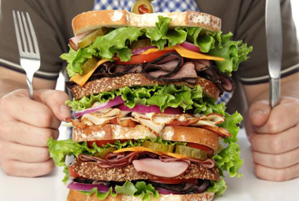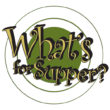Last week, I was in the middle of putting together an oriental noodle salad, mixing the noodles with a soy and sesame oil marinade with a lot of chopped green onions. The only way to do it right was to dig your hands into the bean-thread noodles and the marinade and squish it around until nicely blended and everything coated.
The interesting thing, besides a delicious salad, is how good it felt to be up to my forearms in a giant bowl of fragrant sauces and oils and the stringy, slippery bean threads, mashing and tossing and squeezing it all about. This is to say that cooking is often a very sensual experience. Sensual in the sense of more physically enjoyable than erotic.
Every bread baker knows this. When you are kneading risen dough by hand, you are fondling something alive and growing. Bread dough at this stage may start out ragged, sticky and recalcitrant, but it soon becomes plump, supple, firm but puffy, and – with a touch of olive oil – slippery smooth. As bakers who are also parents know, it’s the feel of a baby’s bottom. And you know that after a time in the oven, it will be wonderful, warm and satisfying. The staff of life.
More vigorous, yet no less sensual, is the making of polenta. Polenta is just corn meal in stock or water that you stir for 20 or 30 minutes or so. It starts out easy, just sloshing around in the hot liquid. But slowly it picks up some bulk and starts resisting the spoon. This gets harder and harder to stir and you start to work up a few beads of sweat and your arm begins to feel the strain. For a firm polenta, the kind that sets up thick and you cut and put on a grill, then you’re really working, waiting for the mush to coalesce, fold in on itself and start to pull away from the side of bowl. When it’s just right, and only experience can tell you when this is, you fold in some parmigiano and a bit of cayenne and pour it out into a pan to cool. A job well done.
Roux is an another matter. In this case, you are after the right color – in a spectrum from light blond to black – that is right for the recipe you’re preparing. Starting with nothing more than a pot, a wire whip and a cup of flour and oil, you heat the oil to near smoking, add the flour and start stirring the mixture with the whisk. It’s over high heat and the color gradually changes from whitish to gold, from gold to reddish brown, from reddish brown to deep dark red to black. And beyond black, burned and inedible
If your final dish is a gumbo and you want a black roux, the whisking gets faster and faster as the roux changes color. The key is to keep the roux from burning. It’s a good idea to have on serious oven gloves – both hands, and shoes (not sandals) – while you work yourself up into a frenzy, with droplets of burning oil flying all over and with smoke pouring off the roux at the red stage and increasing as it moves to black. At times you have to blow away the smoke in the pot to see the bottom, watching for just the right moment when the dark red changes to black. Then, you toss in a bunch of chopped onions/pepper/celery that explodes in the roux in a cloud of steam and frenzied bubbles. This instantly stops the cooking process, cools the roux and lets you step back, catch your breath and wipe your brow and rest a minute. A climatic event, finishing this stage and worthy of some applause, if you have an audience. The real work, and the fun, is over and the final addition of seasonings, stock, sausage, seafood and other ingredients is something of an anticlimax.
I can think of more: making mayonnaise with a wire whip and a bowl, squeezing peeled plum tomatoes in your hand to make a rustic marinara, you get the idea. Cooking is a lot more than adding ingredients to a bowl. It’s sensual and fun.
 If you pay attention to food as you’re eating it, you may notice that the first bite of something good is the best. Your tastebuds react to all the flavor, your mouth enjoys the crunch or smoothness or other texture of the food. The next bite is almost as much fun, but now you know what to expect. By the tenth or eleventh bite, that’s gone. In fact, if you’re honest about it, you really aren’t tasting anything, you’re just eating.
If you pay attention to food as you’re eating it, you may notice that the first bite of something good is the best. Your tastebuds react to all the flavor, your mouth enjoys the crunch or smoothness or other texture of the food. The next bite is almost as much fun, but now you know what to expect. By the tenth or eleventh bite, that’s gone. In fact, if you’re honest about it, you really aren’t tasting anything, you’re just eating. 
